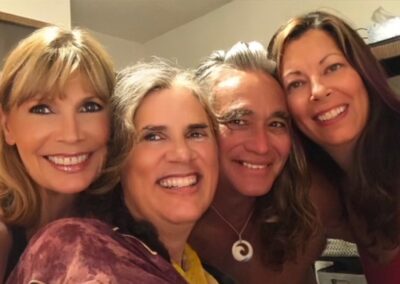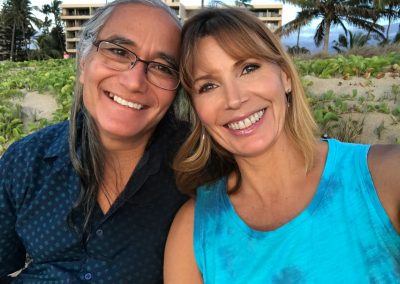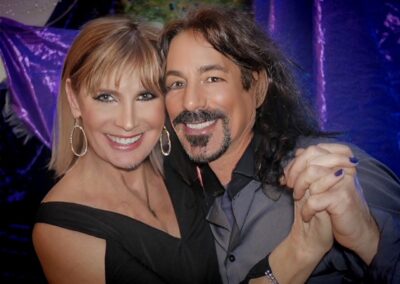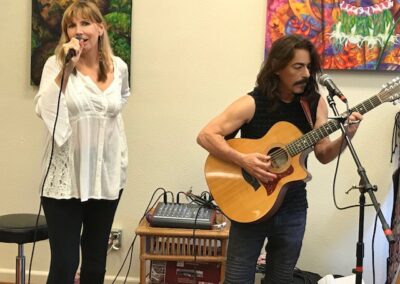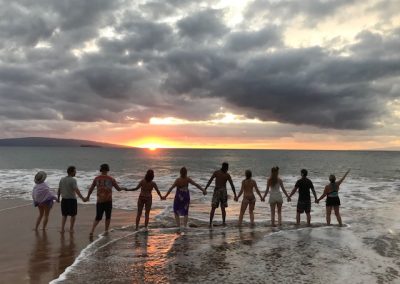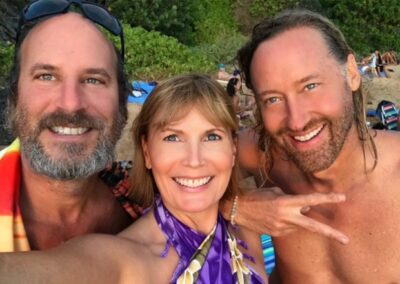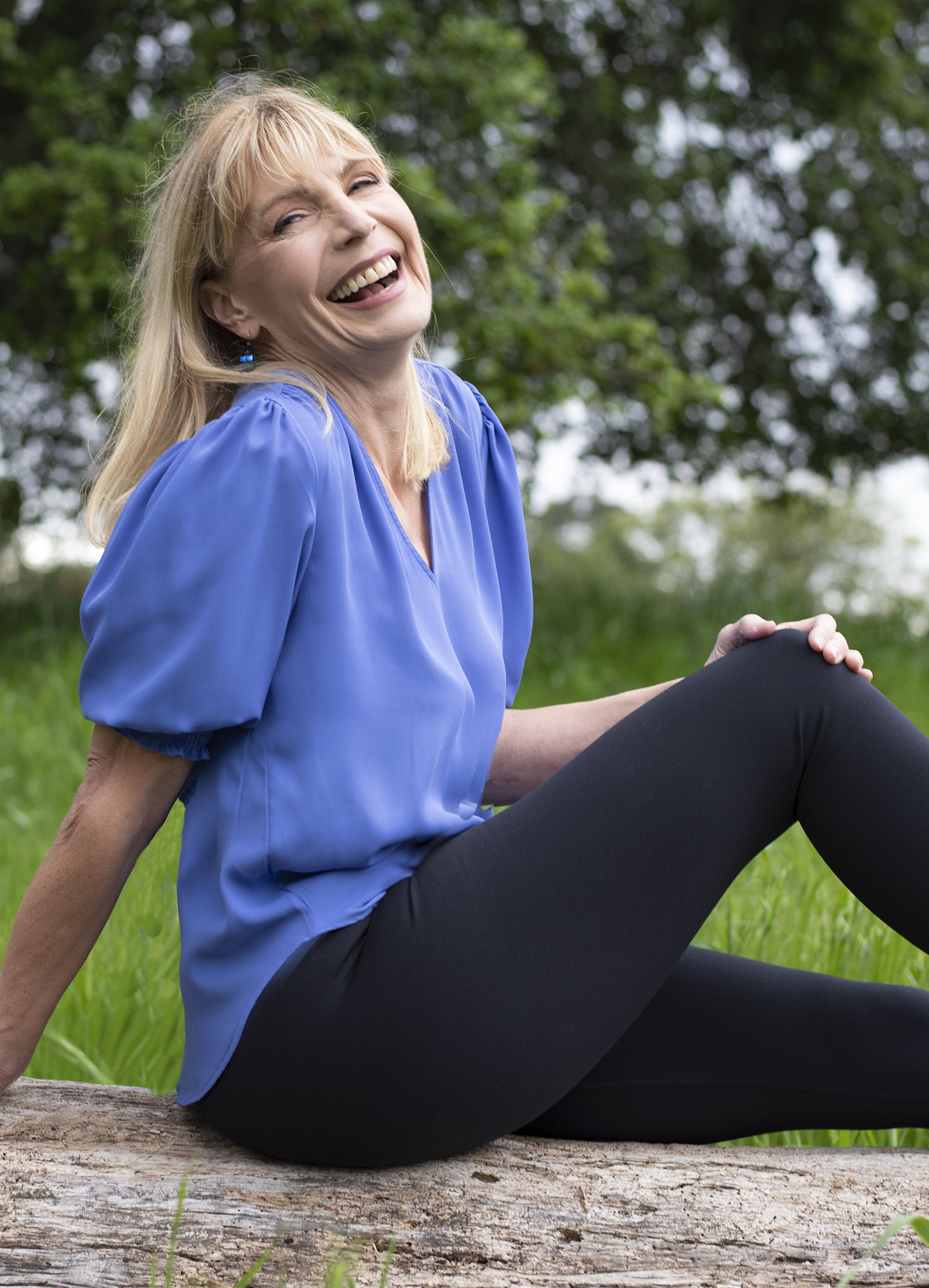
nice to meet you,
I´m Sumati
Sumati Sparks’ first name was given to her by the great living saint, Amma (Mata Amritananda Mayi).
Sumati means pure essence. She is a relationship coach with a life PhD!
She has a regular meditation practice and a deep spiritual orientation to life and relationships. Yet she highly values a life of love, ease and joy. She has an easy laugh, a compassionate heart and a sharp mind.
Sumati has been a personal and spiritual growth junkie her entire life. Her training includes having attended over 40 workshops with the Human Awareness Institute, also known as HAI, is a trained Zegg Forum Facilitator and part of the Network for a New Culture, has studied Non-Violent Communication (or NVC) with Marshall Rosenberg, has been practicing 12-step work in the areas of relationship and addiction since 1985, is a trained PSYCH-K Facilitator (a process used to remove limiting beliefs), has a Yoga & Meditation teacher certification through the Sivananda school, and has studied sacred sexuality with Evalena Rose, Steve & Lokita Carter and other prominent teachers.
Since 2000, she has been coaching people in the areas of relationship and sexuality and now specializes in helping people create successful open relationships.
Sumati Sparks works with:♥ Professional Married Men & Women who have little or no intimacy in their long-term relationship.♥ Single or Divorced People who do not wish to have another traditional relationship.
♥ Couples who want to successfully open their relationship.
♥ Singles & Couples who don’t know where to find other polyamorous people to meet & date.
♥ Heterosexual, cis-gendered as well as Queer, Lesbian, Gay, Bi, Transgender, Intersex and Questioning Persons are most welcome.
frequently asked questions
Q: What do you mean by Open Relationship?
The emphasis is on ethics, honesty, and transparency.
We build upon values of trust, loyalty, the negotiation of boundaries, and ideally, compersion, as well as overcoming jealousy, possessiveness, and the rejection of restrictive cultural standards.
Q: What is compersion?
Q: What are some of the biggest mistakes people new to open relationship make?
1) Not having good communication tools such as NVC:
Often people say: “Don’t you have to do a lot of processing in open relationship?” My response is usually, “No we don’t HAVE to, we GET to!” Human beings are social creatures. And our brains are more complex than any other mammal, primarily because we love to communicate. Good communication creates deeper intimacy, emotional safety and freedom to express ourselves fully. Communication is truly the best lubrication. Therefore, it is essential that people learn and continue to practice healthy non-blaming communication such as Non-Violent Communication also known as Compassionate Communication. There are many other tools out there that can help lovers speak honestly, courageously & vulnerably with one another.
2) Not being honest with yourself about who you are and why you are pursuing open relationship:
When you decide to pursue open relationship, it would behoove you to take a look deep inside to determine what your motives are. Have you always felt like you naturally love more than more person at a time? Or do you want to try it as a form of personal transformation – to stretch yourself? These are valid and healthy reasons. However, if you are only doing it to try to prevent your partner from leaving you, or to prove to your partner that you are attractive to others, you may want to look at other ways to deal with those issues. Open relationship doesn’t usually work for people who are not naturally suited for it. Many people feel they were born this way, sort of like being gay or transgender. Others feel like they don’t want to be restricted by cultural programming and have the courage and emotional maturity to step outside the bounds of societal expectations. For these types of people, open relationship can work if they are willing to sit with discomfort and work through jealousy.
3) Not having any other interests or passions in life outside their relationships:
If you are using multiple relationships as your primary hobby in life and need continuous validation from others to feel loved, worthy, sexy and needed, it’s only a matter of time before you have an emotional melt down. It’s very important that you find and develop something that you are deeply passionate about that does not involve romantic relationships for those times when no one is available for you to be with. If all your lovers are otherwise engaged, what will you do to take care of yourself? Do you have a sport you do? Do you play or write music or make art? Do you do volunteer work? Are you a film buff, a music connoisseur? Do you have close platonic friends with whom you keep in touch regularly? What makes you happy when no one else is around?
Q: How does one handle jealousy in an Open Relationship?
Today we have tools available that can teach us how to manage our feelings of jealously. Jealousy is just a feeling like any other feeling. It will not kill us! (Although it sometimes feels like it will).
I help clients practice sitting with the discomfort of jealousy as well as look at what the jealousy is pointing toward. What are the self-limiting beliefs underneath the jealousy? They usually have to do with not feeling enough. “I’m not ________ enough.” (fill in the blank with sexy, fun, interesting, lovable, smart, blonde, skinny, busty, well-endowed, etc). And once we get to these underlying negative beliefs we can start to change them. And to learn that we are not our feelings!
Once we know who we really are as spiritual beings, we are free to share true intimacy with our partners; to tell them what we truly want and need.
I help clients articulate what they want and need from their partners in a non-blaming way. Maybe you want reassurance? Or maybe you want more alone time, more sex or more time for you to be with your friends or other lovers? I help people develop the courage and skill to ask precisely for what they want and need and to feel like they deserve to get those needs met most of the time!
Q: How do you help people have successful open relationships?
A: It depends on whether I am working with a single person or a couple, and whether that couple is having an active sex life together at the time or not.
Couples who are having an active sex life together at the time we begin our work often need help getting clear about how they want to proceed. Once you step outside the traditional model of monogamy, the sky’s the limit with what you can create. So we sit down and figure out what their ideal scenario might be. People new to open relationship don’t always know what will work for them until they try it. There are bound to be some bumps and bruises in the beginning. So I am there for them as they mix it up and try new things. For example, they might want to try going to a swing party. I help them prepare by talking about what boundaries they want to keep at the party. Afterwards, we review how it went and if they were able to keep the agreements they made. If not, then why? What might they need to do differently next time.
Couples who are not having an active sex life together usually tend to need to have a lot more communication before they add another person to their relationship. Sometimes this communication is the best lubrication and they end up rekindling their passions for one another. Or one of the members of the couple may not be feeing sexual in their life at this time and want their partner to have other relationships. We talk about how to do that in a way that makes both members of the couple feel honored and respected. If both members of the couple wish to date people outside their primary relationship, we talk about what that would look like. Do they want to meet each others new lovers or not? Do they want to hear about the experiences or not? How much time do they want to devote to their new relationships? There are a lot of questions that need to be addressed beforehand to minimize misunderstanding and hurt feelings.
If I am working with a single person, I help them begin to think about what kind of relationship they want. Then I am right there by their side (figuratively) while they experiment until they find out what works best for them.

